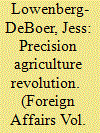|
|
|
Sort Order |
|
|
|
Items / Page
|
|
|
|
|
|
|
| Srl | Item |
| 1 |
ID:
130300


|
|
|
|
|
| Publication |
2014.
|
| Summary/Abstract |
Genetically engineered (GE) foods apply new molecular technologies to agriculture. Widely adopted in the United States, Brazil and Argentina for the production of cons, soybeans, and cotton, they are practically banned in Europe and tightly regulated throughout the world. We have found that GE foods have significantly increase supplies cons, soybeans, and cotton, and lowered their prices, Thus improving food security, GE foods have already contributed to a reductions in the use of pesticides and emissions of greenhouse gases.
|
|
|
|
|
|
|
|
|
|
|
|
|
|
|
|
| 2 |
ID:
137564


|
|
|
|
|
| Summary/Abstract |
Thousands of years ago, agriculture began as a highly site-specific activity. The first farmers were gardeners who nurtured individual plants, and they sought out the microclimates and patches of soil that favored those plants. But as farmers acquired scientific knowledge and mechanical expertise, they enlarged their plots, using standardized approaches—plowing the soil, spreading animal manure as fertilizer, rotating the crops from year to year—to boost crop yields. Over the years, they developed better methods of preparing the soil and protecting plants from insects and, eventually, machines to reduce the labor required. Starting in the nineteenth century, scientists invented chemical pesticides and used newly discovered genetic principles to select for more productive plants. Even though these methods maximized overall productivity, they led some areas within fields to underperform. Nonetheless, yields rose to once-unimaginable levels: for some crops, they increased tenfold from the nineteenth century to the present.
|
|
|
|
|
|
|
|
|
|
|
|
|
|
|
|
|
|
|
|
|